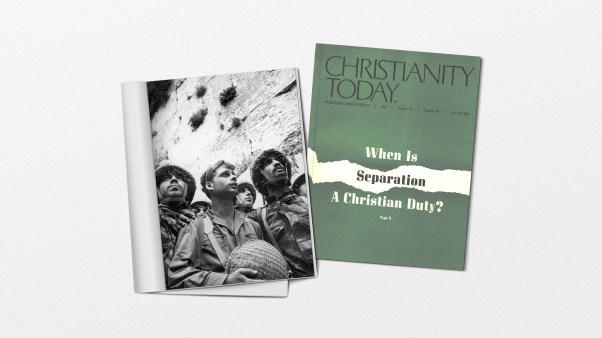The recent protests by Egyptian opposition movements have revealed a deep and abiding prejudice in the U.S. foreign policy community toward the Muslim Brotherhood in Egypt. These feelings are shared among many evangelicals who tend to view all Islamic groups as prone to violence and militantly hostile to Israel and the Christian church.
While it is clear that the Muslim Brotherhood’s views on a range of policy issues fall short of the American ideal of political liberalism, it is unfair to paint the group as the biggest threat in Egypt to the safety of Christians and the survival of Israel. The Muslim Brotherhood’s conservative tendencies pale in comparison to the current regime’s persecution of their own citizens.
Although it may appear at first counter-intuitive, Egypt’s Christians could well be safer if the Muslim Brotherhood were a part of the ruling government.
One Voice Out of Many in Egypt
The Muslim Brotherhood does not represent all of Egyptian society. Estimates vary, but some guess that the Muslim Brotherhood would take between 20 and 40 percent of the vote in free elections. For a variety of reasons, their appeal is limited—some Egyptians balk at their social conservatism, such as wanting to censor sexually explicit content on television or implementing stricter regulations on alcohol. The party does endorse Shari’ah law, but the Egyptian state already recognizes Shari’ah in its constitution.
What the Brotherhood is more known for in Egypt is its calls for reforming the regime, including promoting an independent judiciary and fighting corruption in government. An op-ed published Thursday in The New York Times by a member of the Brotherhood’s leadership defined succinctly their mission: “We aim to achieve reform and rights for all: not just for the Muslim Brotherhood, not just for Muslims, but for all Egyptians.” The debate about the Muslim Brotherhood is not whether they currently support democratic reform in Egypt, but whether they will still support reform after they are in government.
To explain how an Islamic group became committed to democratic reform, something of their long and obscure history in Egypt must be understood. While it is true that some of Al Qaeda’s top leaders came from the group, including the notorious Ayman al-Zawahiri, for most of the group’s history the leadership has focused on reforming the Egyptian state, not fighting international jihad.
The movement first came under the wrath of Egypt’s regime during the 1950s, under Gamal abd el-Nasser’s authoritarian rule. From that point on began the rotating pattern of oppression and dialogue that defined the relationship between the Brotherhood and the regime. It was the periodic jailing of the Muslim Brotherhood’s leaders that drove some of the movement’s members to extremism.
The measures used by the regime to suppress dissent are without a doubt part of the reason why the Brotherhood became dangerous. Beating with electric cables is the surest way to radicalize a human being—if they survive the torture.
Yet something truly remarkable happened in the early 1980s with the Brotherhood: the leadership voluntarily renounced violence and chose to participate in the political order.
In fact, this embrace of peaceful political change was so profound that it prompted a vicious debate among hard-line Islamic extremists on whether the leadership had been co-opted by the state. However, evidence points to a sincere shift of ideology on the part of the Brotherhood. Since then, the Brotherhood has participated in Egypt’s rigged elections, still managing at times to gain the largest number of opposition members in Egypt’s parliament and devoting their time and energy to building an array of social services to help Egypt’s poor.
In recent years, the Brotherhood has even sought to enhance its image by launching a professional website on their policy views, especially in regard to treatment of minorities. The Brotherhood’s leaders have repeatedly stressed that they want to include Egypt’s Christians under all of the state’s protections and freedoms.
An entire section of the Brotherhood’s website is devoted to Egypt’s Christians, including more supportive statements of Copts—Egypt’s Orthodox Christian community—than could ever be ascribed to the current regime. Admittedly, dialogue between the Brotherhood and Egypt’s Christians is restricted to meetings by top leaders, which sadly is a reflection of Egyptian society as a whole. Yet the Brotherhood’s website currently features an article condemning the January shooting at a church in Nag Hammadi that killed six Christians, arguing that the perpetrators probably came from al-Qaeda, who “have committed treason against Islam and the Prophet Muhammad in the vilest manner.” The Muslim Brotherhood’s official position toward the Copts is that they are a part of the Egyptian nation with “privileges and legal rights” that include political, civil, and religious liberties.
The Muslim Brotherhood’s statements are seen as far more credible in Egypt than the regime’s words. If the Brotherhood were elected, they would be held accountable for their platform, which explicitly recognizes religious minorities and calls for their protection against harm.
The current regime’s record on protection of Christians has been reactive at best. Proselytism is banned in Egypt, as well as conversion from Islam to Christianity. Once born a Muslim, one is always a Muslim under state law.
Social discrimination against Christians is widespread, despite several Christians holding high-ranking positions in the Mubarak regime. Egypt’s state does not care for its Christian population beyond appeasing them when either violence against them or international condemnation reaches a critical point. The worst that could be said of the Brotherhood is that they would continue the status quo.
Finally, the Brotherhood does not love Israel. Yet this feeling is not unique to the Brotherhood—virtually all Egyptians have a distaste for the Jewish state and sympathize with the Palestinians. The Brotherhood’s current position is that the peace treaty with Israel should be put forward as a referendum to the people. Given the past regime’s rule by force, this policy would appeal to Egyptians, who had no say in the original signing of the peace treaty.
Yet although the post-Mubarak regime will have to grapple with the peace treaty, it is likely that the next leaders of Egypt will choose to preserve Egypt’s relationship with Israel. The treaty has been institutionalized over the past three decades, and few want to re-initiate a potentially futile and devastating conflict with the regional military superpower. The Brotherhood are, if anything, dedicated pragmatists.
A Christian Response
The gospel demands us to view the Brotherhood differently than we might wish. The most basic desire of the Brotherhood is to be able to practice Islam as they want to without interference from the state.
Currently, the government has the ability to appoint many of the leaders of mosques, and regularly monitors and censors Islamic scholars and preachers. This type of control disgusts devout Muslims and raises a groundswell of support for the Brotherhood. This desire—that religion should be free from state control—is similar to American evangelicals’ desire to protect their religious liberties against growing secular intolerance of genuine expressions of faith.
As the next Egyptian regime takes hold, the Muslim Brotherhood should be held accountable to its promises to provide religious liberty to all Egyptian citizens. Yet it would also make quite an impact—and make a statement about true Christlikeness—if American Christians refrained from knee-jerk criticism of the party.
Tolerance, as many evangelical leaders now stress, does not mean endorsing the views of others, but rather protecting their free expression. A new regime without the Brotherhood would be incomplete, and potentially futile to attempt.
The church has a golden opportunity—if it so chooses—to reach across the cultural and religious divide to show support for a party that has tried, admittedly imperfectly, to embrace democracy while maintaining their faith.
Bob Kubinec is a consultant who lives in Washington, D.C. He has studied and done research on religious and political issues in Egypt and Jordan, and has an M.A. in Middle East Studies from George Washington University.
“Speaking Out” is Christianity Today‘s guest opinion column and (unlike an editorial) does not necessarily represent the opinion of the publication.
Copyright © 2011 Christianity Today. Click for reprint information.
Related Elsewhere:
Christianity Today posted a story today on Egypt’s Christians and reported earlier on how Egyptian Christians are joining calls for reform.
CT also has a special section on Egypt.






